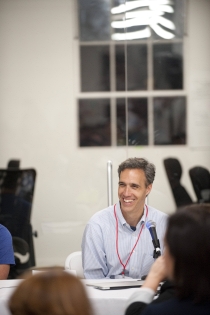END NOTE
Why Cornell is the right fit for a new Big Apple tech campus

Daniel Huttenlocher, dean of Computing and Information Science, speaks at Cornell Silicon Valley's "Startup Stories: The Good, Bad and Ugly" at Zimride headquarters in San Francisco Aug. 10. See larger image
Fostering technology entrepreneurship has been one of my key priorities since I was appointed dean of Computing and Information Science a little more than two years ago. I am proud of the great entrepreneurship education that Cornell offers across its schools and colleges. Today's students can go beyond learning about entrepreneurship in the tech sector to become entrepreneurs at a much earlier stage. The cost – and hence the risk – of starting a technology business has never been lower.
In a world where ideas can quickly become highly useful technology products and services (and where investors' expectations have similarly been tuned to speed), there is increased opportunity for students to bring their ideas to market either by starting their own companies or by joining existing companies that are hungry for their vision and skills.
Many Cornellians are at the center of this new generation of tech companies. The companies they have founded or have funded have created thousands of jobs and billions of dollars of market value during what has been the deepest recession in most of our lives. I have had the privilege of working with some of these people, who are passionate about helping encourage Cornell students and alumni to get their ideas out into the world (such as the hosts of some recent, truly insightful events about tech entrepreneurship: Paul Graham '86 at Y Combinator, Steve Conine '95 and Niraj Shah '95 at CSN Stores, and John Zimmer '06 at Zimride).
My goal is for Cornell to be as good as any school in the country at preparing our students to create and grow tech startups – as founders, key employees and early stage investors. Beyond the excellent technical and entrepreneurship education that we already provide, this involves having strong connections to seasoned entrepreneurs and investors. To that end, we already have several powerful networks, including the Cornell Venture Capital Directory with nearly 200 Cornell investors; the Cornell Entrepreneurship Network and Cornell Silicon Valley, which offer a host of networking and educational events; and the new Startup Career Fair that will be held next February. Cornell is working actively with these groups to create more opportunities to bring people together who can get great new tech products and services into the marketplace.
When New York City Mayor Michael Bloomberg's administration announced last December that it was seeking a school to develop an engineering and applied sciences campus in the city, we saw this as a unique opportunity to accelerate Cornell's development of tech startups by creating a place for faculty, researchers, students, entrepreneurs and established firms to work more closely together on creating commercial value. This new campus would complement Cornell's more basic technology research focus on the Ithaca campus, much in the way that the translational medical research at Weill Cornell Medical College complements basic research in the biological sciences in Ithaca.
The new campus would also focus and concentrate our efforts in a single location, whereas now Cornell entrepreneurs are quickly drawn to the existing U.S. tech centers including not only New York, but also the Bay Area, Boston and Seattle.
What is most exciting to me about this initiative is the powerful alignment of Cornell's approach to technology with the strengths of tech startups in New York City, which are generally not pure technology plays, but rather are about grounding technology in other sectors like media, advertising, health, hospitality, real estate and finance.
Cornell has been the national leader in fusing technology with other disciplines. In 1999 we created Computing and Information Science, a college-level unit that spans traditional college boundaries with the mission of bringing computing technology into every discipline. CIS now comprises the three departments of computer science, information science and statistics, all of which offer degrees in multiple colleges. CIS has become emblematic of the broad ties between technological and non-technological disciplines at Cornell.
Final proposals for the New York City tech campus are due Oct. 28, with the selection to be made by the end of the year. During these next few months, many Cornell faculty, staff, students and alumni will be doing everything they can to ensure that the city understands what we already know – that Cornell not only brings unsurpassed academic quality in the technology arena, but also has the strongest technology business network in New York and the strongest commitment of any institution to the city's technology sector.
Daniel Huttenlocher is dean of Computing and Information Science.